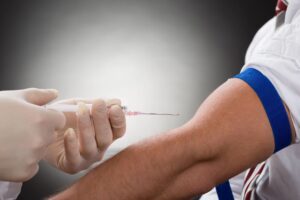STI PANEL
STI stands for sexually transmitted infection. It’s an umbrella term for infections that are primarily transmitted through sexual contact, including vaginal, anal, and oral sex. These infections can be caused by bacteria, viruses, or parasites, and they can affect individuals of all ages, genders, and sexual orientations.
Common STIs include chlamydia, gonorrhea, syphilis, herpes, human papillomavirus (HPV), human immunodeficiency virus (HIV), and trichomoniasis, among others. Some STIs may have visible symptoms, such as genital sores or discharge, while others may be asymptomatic, making regular testing and screenings important for early detection and treatment.
Preventive measures, such as practicing safe sex, using condoms, and getting vaccinated (as in the case of HPV), are crucial in reducing the risk of STIs. Open communication with sexual partners and regular check-ups with healthcare providers contribute to overall sexual health and well-being.
Sexually transmitted infections (STIs) are a significant public health concern, and timely detection is crucial for effective treatment and prevention. At V-Labs America, our STI Panel includes a comprehensive set of tests to identify various pathogens associated with sexually transmitted infections. Here’s a breakdown of the tests we offer:
Bacterial Infections:
1. Chlamydia trachomatis: A common bacterial STI, often asymptomatic but can cause serious complications if left untreated.
2. Gardnerella vaginalis: Associated with bacterial vaginosis, a condition affecting the balance of bacteria in the vagina.
3. Neisseria gonorrhoeae: Causes gonorrhea, a bacterial infection that can affect the genital tract, mouth, and rectum.
4. Treponema pallidum: The bacterium responsible for syphilis, which can progress through various stages if not treated.
5. Ureaplasma parvum and Ureaplasma urealyticum: These bacteria are often found in the genital tract and can contribute to various reproductive health issues.
Viral Infections:
6. Herpes Simplex Virus 1 (HSV-1):
Causes oral herpes and can also lead to genital herpes through oral-genital contact.
7. Herpes Simplex Virus 2 (HSV-2): The primary cause of genital herpes, transmitted through sexual contact.
Other Pathogens:
8. Mycoplasma genitalium: Associated with urethritis and other genitourinary infections.
9. Mycoplasma hominis: Can be part of the normal genital flora but may cause infections under certain conditions.
10. Trichomonas vaginalis: A protozoan parasite causing trichomoniasis, a common STI with symptoms including itching and discharge.
11. Candida albicans: While commonly associated with yeast infections, it can also be present in the genital tract.
Antibiotic-resistant markers:
· KPC (Klebsiella pneumoniae Carbapenemase)
· CTX-M (Cefotaximase-Munich)
· NDM (New Delhi Metallo-beta-lactamase)
· QnrA and QnrS (Quinolone resistance genes)
· mecA (Methicillin resistance gene)
· sul1 and sul2 (Sulfonamide resistance genes)
· dfrA1 and DfrA5 (Dihydrofolate reductase genes)
· VanA and VanB (Vancomycin resistance genes)
Our STI Panel provides a thorough examination, allowing for the detection of a wide range of pathogens. Early identification enables healthcare providers to initiate appropriate treatment, prevent complications, and reduce the risk of transmission. Regular STI screenings are essential for maintaining sexual health and well-being.

